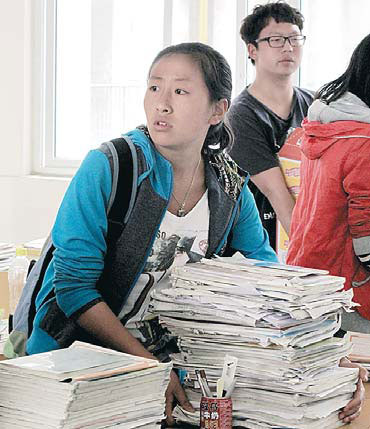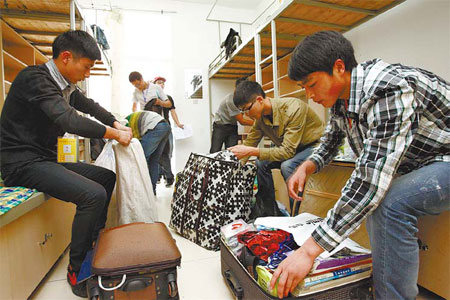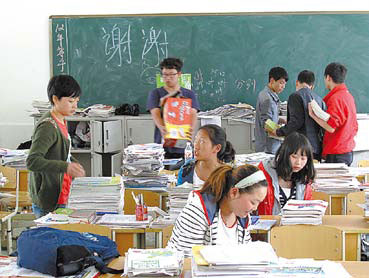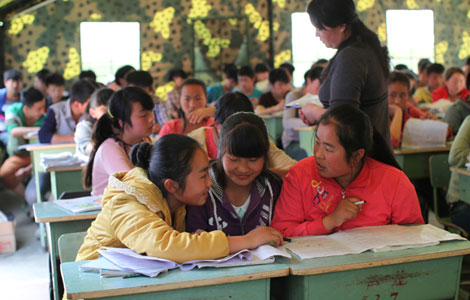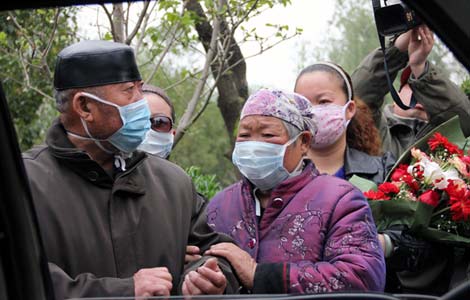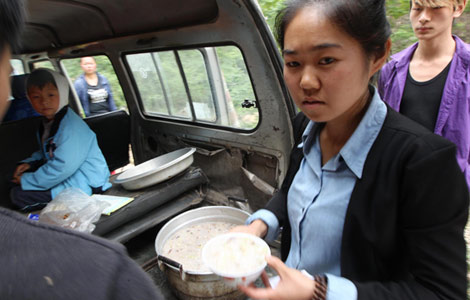Quake offers lessons in rebuilding lives
Updated: 2013-04-26 08:16
By Tang Yue (China Daily)
|
||||||||
|
Students pack up their books at a school in Baoxing county, Sichuan province, on Wednesday, as they prepare to move to the provincial capital Chengdu to resume classes. Tang Yue / China Daily |
|
Students from Tianquan High School unpack at Chengdu Normal College after relocating to prepare for the upcoming national college entrance exam in June. Wang Ruobing / for China Daily |
|
Students from Baoxing Hainan High School's 12th grade prepare to relocate to Chengdu. Their move was abandoned at the last hour because the roads are still too dangerous. Tang Yue / China Daily |
Students returning to classes discover they must also learn to deal with the earthquake's aftermath, Tang Yue reports in Baoxing county, Sichuan.
As the 12th-grade physics class began on Wednesday afternoon, a few seats were still unoccupied and some of the students were almost asleep.
But the teacher at Baoxing Hainan High School didn't complain. The class was being held just four days after a magnitude-7 earthquake hit the area.
Luckily, no one from the school was severely injured, but many were left with nightmares, and they still had to deal with frequent aftershocks.
Like most residents and rescuers, the students have been living in tents on a soccer field. Some caught colds after a rainstorm on Tuesday night.
It takes time for life to return to normal and even longer for inner scars to heal. But with the national gaokao, China's college entrance exam, just six weeks away, the 186 students in their final year of senior high school can almost hear the seconds ticking away.
They became even more anxious when students in the neighboring quake-stricken counties of Lushan and Tianquan were relocated to Chengdu, the capital of Sichuan province, on Wednesday, so they could resume preparations for the exam as soon as possible.
However, the frequent landslides on roads connecting Baoxing and the outside world made it too dangerous for students from the Baoxing school to travel.
But time was running out, and as the students couldn't wait any longer, the school resumed classes on Wednesday morning. The lessons were held in the usual buildings, despite frequent aftershocks, the noise from the football field where more than 2,000 displaced residents are being housed, and a lack of running water and electricity.
The teaching complex, built after the 2008 Wenchuan earthquake, has been checked by the provincial authorities and deemed safe for occupation, according to Zhu Shenyue from the county education bureau.
More bitterness
It was 2:11 pm and the teacher was explaining about friction. "An earthquake's coming!" shouted a boy sitting in the back row. A few of the girls started to scream. Two boys had already stood up and were ready to run toward the door.
The tremor didn't last long, only two or three seconds. As the aftershock passed, the teacher and some of the students murmured "Calm down, calm down" in an attempt to comfort the others, and maybe also themselves.
The teacher, Bi Qiang, in his 40s, decided to check the condition of the class next door. As Bi walked out of the room, a girl shouted loudly, "Teacher, don't run away!"
The class burst into laughter and the lesson resumed a few minutes later.
"We might seem fine, but I know everyone was frightened," 18-year-old student Li Zengyu told me later. "Some boys in my class used to be very naughty, but they just stayed silent today."
The resumption of classes came as bittersweet news to Li. She was desperate to study for the exam, but couldn't help be concerned about aftershocks.
"The building might be safe, but it is so terrible when it shakes. We tried to concentrate but it was really hard," she said.
Meanwhile, the behavior of some of her peers has caused her almost as much distress as the quake.
"After the earthquake, we bought some food, enough for everyone, but some of our classmates just rushed in and took it without any concern for the others. That really got me down," said Li, on the verge of tears.
"But my best friend didn't forget me when the earthquake happened. She called me to tell me to hide under the table, it was so touching. Also, many volunteers have traveled a long way to come to help us. That's also really touching," said the girl, who has volunteered to help out in the kitchen in the past few days.
Meanwhile, student Wu Xiaolong, 19, said a number of young people occupied the first batch of tents put up right after the earthquake, despite the fact that they were intended for the sick and the elderly.
He also said the school hadn't been able to provide accommodation for its boarding students in the first two days after the quake.
Baoxing's great hope
Baoxing is well known in China as the hometown of the panda. The first recorded sighting of the animal happened there in 1869. Sadly, the place is not as famous for "good students".
During the school's 58-year history, not one of its graduates has attended Peking or Tsinghua universities, China's elite educational establishments.
Two-thirds of the county's students with the highest scores in the senior high school entrance exam choose to study outside Baoxing, according to Li Fangling, the school principle.
But this year's batch of 12th-grade students has worked harder than any of their counterparts in the past few years and great things were expected of them.
A sobering message had been written on the blackboard in Classroom No 3: "12 years for 9 hours", referring to the number of years the students have studied since primary school compared with the combined duration of the gaokao exam.
"We cannot rely on the relief workers forever. We have to build a new life by ourselves," said Zhu, from the county's education bureau, in his opening remarks to students on the day classes resumed.
"You are the future of Baoxing. You are the hope of Baoxing. I hope you can conquer all these difficulties and achieve good results in the gaokao."
Instead of the regular curriculum, the students listened to a lecture delivered by Chen Ting, a psychological therapist, which replaced the first lesson.
Chen encouraged the students to articulate their fears, and provided relaxation tips. Unlike Zhu, she also played down the importance of the upcoming exam.
"Gaokao is not the only way to a good life and might not be the best choice for everyone. And do remember, you are taking the exam, not your teachers or your parents. So just take it easy, don't carry an extra burden," she advised.
Leaving for Chengdu
When the afternoon's first lesson ended at 2:45 pm, the class teacher Yu Shiming brought more bittersweet news: Like their peers from Lushan and Tianquan, the Baoxing students were to be relocated to study in Chengdu. They were scheduled to leave on Thursday morning.
"I was happy to learn that because it is really hard to study without fear here. It will also be my first trip to Chengdu, the furthest I have ever traveled from my home," said Yang Xin, who constantly ranks as one of the top 10 students in his class.
"But I haven't been back home since the earthquake. My parents told me that the house is still habitable, but I'm afraid they only said that for fear of distracting me from my studies," said the 18 year old from Lingguan town, 15 km south of the county seat. Yang was right to be concerned; his hometown suffered some of the worst devastation caused by the quake.
After Yang phoned home to tell his family about the relocation plan, his parents rode a motorbike from their home to the county seat to see him before he left for Chengdu, 200 km away. They gave him spending money of 700 yuan ($113).
"Our family's economic situation is not very good. It's a great comfort that he studies hard and doesn't spend his money on useless things," said Yang's mother, farmer Li Xiuying.
Father Yang Mingjun had stern words for his son: "Behave yourself in Chengdu and concentrate on your studies. People will know that you are from the earthquake zone, so don't let Baoxing down."
Yang Xin said that coming from a humble background and surviving the earthquake has given him extra motivation to study hard for the exam. "It might not be the only choice, but for me. I think it is the best option," said the young man, who wants to be a journalist.
"Compared with those who lost their lives, I'm really lucky to still have the chance to fight for a better life. I will treasure it. Also, my parents are working really hard to pay my tuition fees; I have no reason to be lazy in the last few moments before the gaokao."
Dreams of travel
While the students were busy calling their parents to pass on the news, Wu Xiaolong was busy distributing Math Weekly, a homework exercise book, to the class.
He has been Class 3's monitor for three years and sounded like a born leader when he spoke of the earthquake and his hometown.
"The earthquake was brutal and claimed many lives. No one wanted it to happen, of course, but to tell the truth, I think it will help develop the local economy," he told me one evening as we sat in the stand of the football stadium.
"Just look at Wenchuan. The government has poured in a lot of money and tourism is booming."
Asked about his college plans, Wu said he wants to study computer programming, even though he doesn't have a computer and his home is so isolated there is no Internet access.
"I want to have my own business one day and I want to be rich because I want to travel so much," he said.
"I want to go to Japan and I also want to go to Europe to experience the luxury and leisurely lifestyle," said the 18 year old, who has never been outside Sichuan.
Li Zengyu, however, had no interest in the economy. "I care more about justice. I want to study law at university, if I can make it," said the diminutive young woman.
She wants to stay in the city after graduating from college, "not only because the outside world is more colorful, but also because the people are more civilized".
But she has concerns for her family. "My parents wouldn't get used to life in the city and I don't want to be away from them. Maybe in a few years Baoxing will be more developed and I will find a job here."
No exit
The students were scheduled to leave Baoxing at 8 am on Thursday, but a large number of them gathered at the school gate half an hour ahead of the appointed time.
However, the bus was late, causing some consternation. "Students facing the gaokao really can't afford to wait," murmured one girl.
But they did have to wait, so some stretched out on the grass, alongside their bags of books and clothing.
Meanwhile, the headmaster and officials from the education bureau were busy making phone calls.
Some time later, the students were told the road was still too dangerous for them to travel to Chengdu. The move had been abandoned and so they would stay in Baoxing to prepare for the all-important exam.
"I don't know what to say," said Wu on hearing the news. "Some students are happy and some are sad. Anyway, I suppose we can only do what we're told."
Wu Wencong and Peng Yining contributed to the story.
Contact the writer at tangyue@chinadaily.com.cn
(China Daily 04/26/2013 page6)
Most Viewed
Editor's Picks
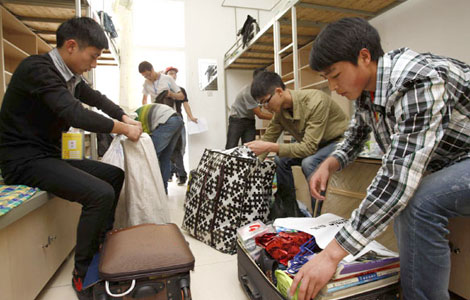
|

|

|

|

|

|
Today's Top News
Phone bookings for taxis in Beijing
Chinese consumers push US exports higher
Seoul delivers ultimatum to DPRK
Boston bombing suspects intended to attack NYC
No let up in home price rises
Bird-watchers undaunted by H7N9 virus
Onset of flood season adds to quake zone risks
Vice-president Li meets US diplomat
US Weekly

|

|
